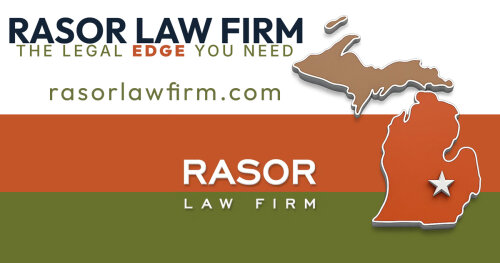Best Toxic Tort Lawyers in Maryland
Share your needs with us, get contacted by law firms.
Free. Takes 2 min.
Or refine your search by selecting a city:
List of the best lawyers in Maryland, United States
About Toxic Tort Law in Maryland, United States
Toxic tort law focuses on cases where individuals are harmed by exposure to dangerous chemicals or substances. In Maryland, toxic tort claims commonly involve exposure to asbestos, mold, pesticides, lead, industrial chemicals, or pharmaceuticals. These cases can arise from workplace conditions, consumer products, contaminated water, or environmental hazards. Maryland courts recognize a variety of legal claims related to toxic exposure, including personal injury, property damage, and wrongful death. Understanding how Maryland law approaches toxic tort cases can help individuals pursue compensation for injuries or damages resulting from toxic substances.
Why You May Need a Lawyer
Toxic tort cases often involve complex scientific and medical evidence, as well as complicated legal arguments. You may need to consult a lawyer if:
- You or a loved one has been diagnosed with an illness linked to chemical exposure at home, work, or in the community
- Your property has been contaminated by hazardous materials causing physical damage or reducing property value
- You suspect your child has suffered lead poisoning due to old paint or water supply issues
- You have experienced health issues after using a defective product containing harmful substances
- Government agencies or private companies are undertaking environmental cleanups near your home or workplace
A lawyer can help you determine if you have a valid claim, collect evidence, negotiate with insurance companies or liable parties, and navigate state and federal regulations for the best possible outcome.
Local Laws Overview
Toxic torts in Maryland are subject to both state and federal law. Some key aspects of local laws include:
- Statute of Limitations: Maryland law sets strict time limits on filing toxic tort claims, often three years from the date the injury was discovered.
- Maryland Lead Poisoning Prevention Program: This state program regulates lead in rental properties and offers resources for families affected by lead exposure.
- Environmental Protection: The Maryland Department of the Environment oversees hazardous waste cleanup, air and water quality, and enforces both state and federal environmental regulations.
- Burdens of Proof: Plaintiffs must often show exposure to a toxic substance, link that exposure to an injury, and prove that the defendant was responsible for the exposure.
- Joint and Several Liability: In some situations, Maryland law holds multiple parties jointly liable for damages caused by toxic exposure.
Toxic tort claims in Maryland may involve product liability, negligence, strict liability, or premises liability laws, depending on the circumstances of the case.
Frequently Asked Questions
What is a toxic tort?
A toxic tort is a legal claim for damages resulting from exposure to hazardous substances like chemicals, asbestos, mold, pesticides, or pharmaceuticals.
What are examples of common toxic tort cases in Maryland?
Common cases include asbestos exposure at work, lead poisoning in rental properties, chemical spills affecting neighborhoods, and pesticide poisoning on farms.
How long do I have to file a toxic tort lawsuit in Maryland?
Generally, you must file your claim within three years of discovering your injury. There are some exceptions, so consult a lawyer for specific guidance.
Do I need a lawyer for a toxic tort claim?
Toxic torts are complex and often involve scientific evidence. An experienced lawyer can help protect your rights and build a strong case.
Can I sue for emotional distress caused by toxic exposure?
Maryland law may allow claims for emotional distress, especially when accompanied by physical injury or property damage, but these claims are complex and require specific legal advice.
Who can be held liable in a toxic tort case?
Potential defendants include manufacturers, property owners, employers, landlords, contractors, and companies that improperly stored or disposed of toxic materials.
What compensation can I receive from a toxic tort lawsuit?
Possible compensation includes medical expenses, lost wages, property damage, pain and suffering, and in some cases, punitive damages.
How do I prove that toxic exposure caused my illness?
Proof usually involves medical records, expert testimony, scientific studies, and evidence linking your exposure to the defendant’s actions or negligence.
Can a group of people file a toxic tort lawsuit together?
Yes, toxic torts are often pursued as class actions or mass torts when multiple people are affected by the same source of exposure.
What should I do if I believe I have been exposed to a toxic substance?
Seek immediate medical attention, document your symptoms and potential sources of exposure, and consult a lawyer experienced in toxic tort law as soon as possible.
Additional Resources
If you need further assistance or information regarding toxic tort law in Maryland, you may find these organizations and agencies helpful:
- The Maryland Department of the Environment - Offers resources on environmental hazards, cleanup programs, and reporting violations
- Maryland Office of the Attorney General - Provides consumer protection information and legal resources
- Maryland Legal Aid - Offers free or low-cost legal services to eligible individuals
- The Maryland Lead Poisoning Prevention Program - Supports families dealing with lead hazards in homes
- Centers for Disease Control and Prevention (CDC) - Provides information on the health effects of toxic exposures
- Occupational Safety and Health Administration (OSHA), Maryland Office - Addresses workplace safety and hazardous material regulations
Next Steps
If you or someone you know is dealing with exposure to a toxic substance in Maryland, take the following steps:
- Prioritize your health and safety by seeking medical evaluation and treatment for any symptoms.
- Collect evidence such as medical records, photographs of the exposure source, communications with responsible parties, and documentation of related expenses.
- Report the incident to relevant authorities, such as local health departments or the Maryland Department of the Environment, if necessary.
- Contact an experienced Maryland toxic tort attorney for a consultation. A lawyer can assess your case, explain your legal options, and help you navigate the claims process.
- Act quickly, as legal deadlines apply and evidence can become more difficult to gather over time.
Remember, toxic tort cases can be challenging, but with the right legal support and resources, you can better protect your health, your family, and your rights.
Lawzana helps you find the best lawyers and law firms in Maryland through a curated and pre-screened list of qualified legal professionals. Our platform offers rankings and detailed profiles of attorneys and law firms, allowing you to compare based on practice areas, including Toxic Tort, experience, and client feedback.
Each profile includes a description of the firm's areas of practice, client reviews, team members and partners, year of establishment, spoken languages, office locations, contact information, social media presence, and any published articles or resources. Most firms on our platform speak English and are experienced in both local and international legal matters.
Get a quote from top-rated law firms in Maryland, United States — quickly, securely, and without unnecessary hassle.
Disclaimer:
The information provided on this page is for general informational purposes only and does not constitute legal advice. While we strive to ensure the accuracy and relevance of the content, legal information may change over time, and interpretations of the law can vary. You should always consult with a qualified legal professional for advice specific to your situation.
We disclaim all liability for actions taken or not taken based on the content of this page. If you believe any information is incorrect or outdated, please contact us, and we will review and update it where appropriate.
Browse toxic tort law firms by city in Maryland
Refine your search by selecting a city.















